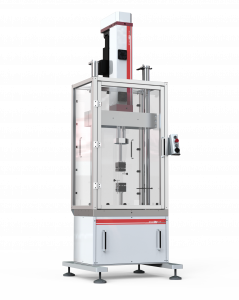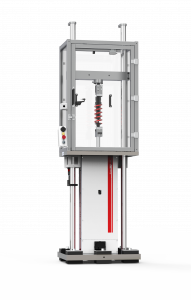What is a compression test?
Compression test is a fundamental mechanical evaluation method, stands alongside tensile and flexion tests in materials testing. It involves applying compressive force to a material specimen, typically in cuboid or cylindrical form, using specialized fixtures or platens on a universal testing machine. The test measures the material’s response to crushing loads and helps determine crucial properties like elastic limit, yield point, and compressive strength.
How to perform a compression test?
Conducting a compression test requires a compression testing machine equipped with load cells, software, and specific platens. In the compression testing process, engineers apply pressure to the specimen using specific platens and fixtures tailored to the material type and testing requirements. For example, different platens may be used for testing rigid plastics, foams, or metals. Once the compression test is initiated, the machine applies a controlled force to the specimen, and data is collected in real-time. The resulting stress-strain diagrams provide valuable insights into the material’s behavior under compression.
Engineers analyze these diagrams to extract essential properties like elastic modulus, yield strength, and compressive strength. By interpreting stress-strain curves, engineers can identify crucial material characteristics such as yield points, deformation behavior, and failure modes. This analysis is essential for evaluating the material’s performance and determining its suitability for its intended application.
Purpose and importance of compression testing
Compression testing plays a key role in various industries by evaluating material integrity, safety, and performance. Manufacturers utilize compression tests to assess materials, components, and products during different manufacturing phases. From selecting materials for new applications to ensuring product quality and compliance, compression testing aids in optimizing design, improving efficiency, and enhancing product reliability. Examples of industries where compression testing is indispensable include automotive, aerospace, construction, and medical devices. By detecting material weaknesses early on and ensuring product durability, compression testing contributes significantly to cost savings and overall product quality.
Common compression tests
Common compression test applications include testing plastic tubes, foam materials, paper, cardboard, metals, and medical devices. Specific test types include:
- Top-load (crush) test;
- Flexure (bend) test;
- Spring test.
Each tailored to assess different material properties under compression.
Popular standards in compression testing
Several international standards govern compression testing procedures, ensuring consistency and accuracy across industries. Standards such as:
- ASTM C109 – Standard Test Method for Compressive Strength of Hydraulic Cement Mortars
- ASTM D575 – Standard Test Methods for Rubber Properties in Compression
- ASTM D695: Standard test method for compressive properties of rigid plastics and continuous fiber-reinforced composite materials (end loading compression)
- ASTM D1621 – Standard Test Method for Compressive Properties Of Rigid Cellular Plastics
- ASTM D2412 – Standard Test Method for Determination of External Loading Characteristics of Plastic Pipe by Parallel-Plate Loading
- ASTM D3574 – Standard Test Methods for Flexible Cellular Materials – Slab, Bonded, and Molded Urethane Foams
- ASTM D6641 – Standard Test Method for Compressive Properties of Polymer Matrix Composite Materials Using a Combined Loading Compression (CLC) Test Fixture
- ASTM D7137 – Standard Test Method for Compressive Residual Strength Properties of Damaged Polymer Matrix Composite Plates
- ASTM F1306: Standard test method for slow rate penetration resistance of flexible barrier films and laminates
- ASTM F3067: Standard guide for radial loading of balloon-expandable and self-expanding vascular stents
- ISO 844 – Compression test on rigid cellular plastics
- ISO 7886-1 -Plunger glide force on sterile hypodermic syringes for single use
Compression testing machines
At STEP Lab, we offer two series of testing machines for conducting compression tests, EA and UD. These machines feature customizable configurations to accommodate different testing requirements, ensuring accurate and repeatable results across diverse applications.
EA SERIES
Electromechanical actuators
Max dynamic load: 200 kN
Max static load: 268.5 kN
Max acceleration: 2 G
UD SERIES
Linear motor testing machines
Max dynamic load: 100 kN
Max static load: 58 kN
Max acceleration: 12 G




